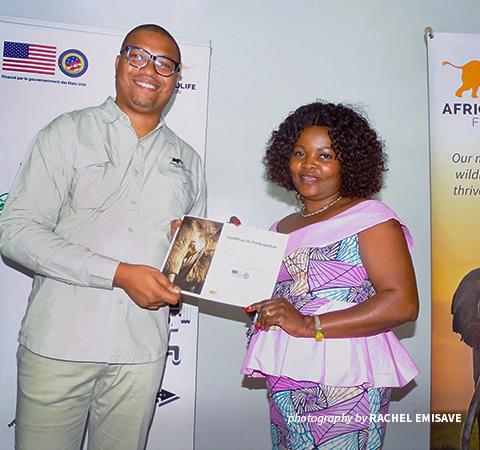AWF Trains DRC Ports and Airports Officers to Identify Wildlife Species
General Inquiries
Tel:+254 711 063 000
Ngong Road, Karen, P.O. Box 310
00502 Nairobi, Kenya
African Wildlife Foundation (AWF) held a five-day training in Kinshasa for law enforcement officers working at airports and ports in the Democratic Republic of Congo (DRC) from March 6 to 10, 2023.
During the first three days, participants learned techniques to improve the identification of species and wildlife specimens, while the last two days focused on understanding and respecting human rights.
These two successive sessions were attended by 25 officers, comprising 20 men and 5 women. The objectives were to ensure that law enforcement officers respect the law in the performance of their duties and apply international best practices in human rights; and to improve species identification and address weaknesses in the criminal justice system by improving understanding of the law, the nature and extent of wildlife crime, the proper handling of evidence, and the presentation of evidence in court.
During the training workshops, most participants recognized that they had been duped in the past about wildlife products such as ivory, rhino horn, or pangolin scales due to lack of information.
“The videos and illustrated presentations were very informative. After this training, I realize that recently I passed up a package of pangolin scales. Because I did not know the physical description, my colleague convinced me that it was moringa leaves, as the owner claimed," said Kanyeba Kalonga Lyliane, a control agent of the Régie des Voies Aériennes (RVA) at N'Djili International Airport.
She continued: "It is upsetting to see how traffickers invest in finding techniques to conceal wildlife products. From now on, I will rely on my flair as a controller, and above all, I will be more demanding."
With financial support from the Office of International Narcotics and Law Enforcement Affairs (INL), AWF has, since February 2022, launched the ‘Fighting International Wildlife Trafficking in the DRC’ project to reduce the capacity of criminal groups to engage in and profit from poaching and trafficking of protected animals and their by-products originating in or transiting DRC.
This trafficking is encouraged by the lack of expertise in the identification of illegal wildlife products and methods of concealment, limited cooperation between law enforcement agencies, the lack of thorough investigations, and minimal deterrent and exemplary penalties. As such, AWF is partnering with the Office Congolais de Contrôle (OCC), the RVA the Direction Générale des Migrations (DGM), the Direction Générale des Doines et Assises (DGDA), and the Société Commerciale des Transports et Ports (SCTP).
AWF and implementing partner Juristes pour l'Environnement (JUREC) are working in support of the Congolese Institute for Nature Conservation (ICCN) to build the capacity of these law enforcement agencies to interdict, investigate, enforce, prosecute, and adjudicate wildlife trafficking through N'Djili International Airport and Matadi Port.

AWF Senior Legal Officer Joe Kassongo presents a certificate to a participant
Indeed, due to the demand for ivory on international markets, poaching in the DRC has turned into a large-scale transnational organized criminal activity controlled by national and international, often militarized, networks. In addition to being a source country for ivory and other illicit wildlife products, the DRC plays a role in connecting poachers and traffickers elsewhere in West and Central Africa to international markets. The illegal trade in bushmeat across borders poses a major risk for the spread of zoonotic diseases.
"The N'Djili International Airport in Kinshasa is particularly vulnerable and is recognized as one of the international transit centers for illicit wildlife products, and other illicit products such as gold, [while] the port of Matadi on the Congo River is one of the main African ports that has reported a high volume of illegal wildlife seizures in recent years," said AWF Senior Legal Officer Joe Kassongo.
He continued, "Traffickers are exploiting the DRC's porous land borders and the relatively weak airport security of the N'Djili International Airport to bring illegal wildlife products from other countries into the DRC and fly them to consumer countries with connections through airports in Africa, Europe and the Middle East.”